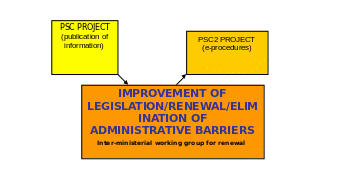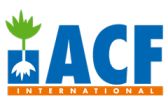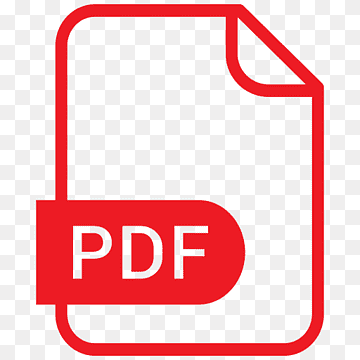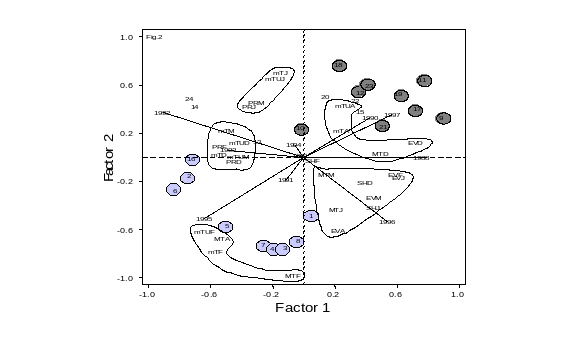WORK PROGRAMME OF THE INTERMINISTERIAL WORKING GROUP FOR THE
8 AGRES 1 (XXVIIE00) PROGRAMMEBUDGET DE L’ORGANISATIONACCUEIL PROGRAMME DÉTAILLÉ EN UN CLIN
BSC (HONS) ECONOMICS PROGRAMME SPECIFICATION 1 PROGRAMME
DETTE PROGRAMMET BRUKER KLASSEN RANDOM TIL Å TREKKE
IFIP AGORA INITIATIVE UNESCO PARTICIPATION PROGRAMME 20082009
LATVIA–LITHUANIA CROSS BORDER COOPERATION PROGRAMME 20072013 „FORMATION OF
Številka:
WORK PROGRAMME OF THE INTER-MINISTERIAL WORKING GROUP FOR THE RENEWAL OF LEGISLATION IN THE FIELD OF REGULATED ACTIVITIES AND PROFESSIONS
1.1. INTRODUCTION
In 2010, the Government of the Republic of Slovenia adopted the Action Plan for the Implementation of the PSC project and Establishment of the Business Portal – point of single contact – to support procedures for acquiring permits needed to practise regulated activities in the Republic of Slovenia. The PSC project has several goals, inter alia to improve legislation (elimination of unnecessary barriers, simplification of procedures etc.) relating to the field of regulated activities and professions.
Due to the complexity of the PSC project, it was divided into two parts, i.e.:
PSC1 (information function) – a) web portal for foreigners – will offer all information (in English) to service providers and users in any Member State on conditions and permits (with an emphasis on cross-border provision and conditions), administrative procedures and costs in the Republic of Slovenia in one place in a simple and transparent manner; b) web portal for domestic entities will offer information on conditions for conducting business in the Republic of Slovenia, establishment of companies, acquisition of permits, conducting business in the Republic of Slovenia, and connect domestic entities with other EU Member States and information on cross-border operation.
PSC2 (process function) – the information listed and structured on a qualitative basis will be the basis for the implementation of electronic support for procedures related to the issuing of various permits; the PSC2 web portal will allow providers of services from any EU Member State to perform all formalities and procedures defined by the Services Directive.
In addition to the transparent online publication of information on conditions and procedures, the critical analysis of over 400 regulations determining the conditions and procedures for performing activities and profession in the Republic of Slovenia is of key importance within the PSC1 project.
In cooperation with competent line ministries, the new inter-ministerial group for the renewal of legislation in the field of regulated activities and professions (hereinafter referred to as the group for the renewal of professions and activities – GRPA)1, comprised of a strategic and expert section of members, will study regulations and propose measures for:
an appropriate and comprehensive implementation of the Services Directive,2
an appropriate and comprehensive implementation of the Professions Directive,3
the renewal or improvement of legislation in terms of the elimination of administrative barriers, primarily of overburdening and unnecessary conditions and procedures for performing activities and professions,
deregulation, if it is established that the conditions and procedures do not comply with EU legislation or the practice of Member States.
standardisation and simplification of procedures for the efficient use of the project for electronic support for procedures (PSC2).
Upon the proposal of members, the proposed measures will be submitted for discussion to the Government of the Republic of Slovenia by the head of the GRPA, i.e. the Minister of Justice and Public Administration. In accordance with the anticipated deadlines determined by the Government, the competent ministries will have to implement these measures and report to the GRPA on implementation. At least twice a year, the Ministry of Justice and Public Administration prepares a report on the realisation of the measures and submits it to the Government.
The goals of the GRPA are closely connected with the goals of the Government of the Republic of Slovenia in the field of better legislation and the elimination of administrative barriers. In July this year, the Government adopted a renewed programme of measures for the elimination of administrative barriers and reduction of administrative burdens by 25 per cent (270 measures), and determined key priorities. Due to the complexity of the contents of regulations of wider scope, the programme of renewing legislation for performing activities and professions is implemented separately. The reports on the implementation of measures will also be prepared separately for the Government. Regardless of the division of tasks of the groups, it is necessary to emphasise that this is actually a 'sub-project' in the field of better legislation and the elimination of administrative barriers.
1.2. REASONS FOR THE ESTABLISHMENT OF THE GROUP
Slovenia is one of EU Member States with the largest number of regulated professions and activities. Austria and Germany have moderate (medium) regulation, while Italy and Slovenia are among the countries with strict (very intensive) regulation of professions and activities. However, in Slovenia greater emphasis is put on the quantity rather than the quality of individual regulations. This leads to typical administrative barriers or unnecessary bureaucracy, which paralyse the competitiveness of the economy.4
In general, the deregulation of professions and activities has positive effects on the simplification of the business environment, greater flexibility for job seekers and employment, greater mobility of workers within the EU, and greater competitiveness.
It should be emphasised, however, that the goal of the group will not be mere deregulation, but primarily to improve legislation in this field, study the possibilities of simplification within the existing regulations, eliminate unnecessary barriers, and accelerate and simplify procedures related to permits.
After reviewing over 100 regulated activities and approximately 30 regulated professions (within the PSC1 project)5 , the Ministry of Justice and Public Administration established that:
in comparison with other EU Member States, the number of regulated professions (according to the data from 2011, there are 325 of them) in Slovenia is excessive and there are additional 300 regulated activities,
regulations of activities and professions are non-transparent, burdened with excessive administration, and regulations are often duplicated (e.g. in tourism: regulation of activity: licence for travel agency; regulation of profession: tourist guide, tourist escort …);
legislation in this field is still not harmonised and procedures related to the acquisition of different permits necessary for performing particular activities or for obtaining professional qualifications (various licences, decisions, verifications, register entries, etc.) are administratively burdening, unclear and often lengthy;
adequate implementation of the Directive on the recognition of professional qualifications (adopted in 2005) and the Directive on services in the internal market (adopted in 2006) has not been sufficiently performed.
Also important are the findings of the European Commission in the Communication on the implementation of the Services Directive "A partnership for new growth in services 2012-2015"6 of 8 June 2012, which establishes that EU Member States still face great challenges in the field of additional simplification and rationalisation of procedures for the assurance of cross-border access (temporary service provision in another Member State), mainly due to the fact that there is still no differentiation between the requirements applicable in the event of establishment and the requirements applicable to cross-border or temporary services. The conditions for cross-border provision of services should be easier and, above all, clearer. A more detailed report by the European Commission (Detailed information on the implementation of Directive 2006/123/EC on services in the internal market7) further establishes that Slovenia has adopted the horizontal Act on Services in the Internal Market, but the legislation in this field has not been sufficiently amended (there are often no clear boundaries between the conditions for a registered office and those for temporary or cross-border provision of services). By establishing an inter-ministerial working group, the process of revision, modification, simplification and possible deregulation of legislation in this field will be expedited, which will enable the aforementioned effects to take place in shorter period. At the same time, we should be aware that the provisions of the directives (on services, recognition of professional qualifications and on electronic commerce) should be used in a harmonised manner and by no means separately for each field.
The reason for establishing the group is closely related to the more efficient and quality implementation of the PSC project or the implementation of sub-projects PSC1 and PSC2. However, what is most important is to combine the activities related to professions and activities, and closely combine the activities of sectors of the Ministry of Justice and Public Administration, Ministry of Economic Development and Technology, and Ministry of Labour, Family and Social Affairs.
1.3. GOALS AND TASKS OF THE INTER-MINISTERIAL GROUP
The key tasks are aimed at improving legislation on the regulation of activities and professions in the Republic of Slovenia. The goal is to simplify and improve the business environment in order to develop entrepreneurship and competitiveness in the Republic of Slovenia. The PSC1 project is actually aimed at the publication of information on entry and other conditions, while the PSC2 project concerns e-procedures. The most important part takes place between the two phases of the project when regulations need to be ‘refreshed’, but primarily procedures need to be improved, simplified and standardised, and, if necessary, deregulation performed.
The tasks of the inter-ministerial working group will thus be:
management and coordination of the work of the working group and, if necessary, other stakeholders (members of the Ministry of Justice and Public Administration),
analysis of regulations in the field of regulated activities and professions (all group members),
preparation of concrete proposals and measures for amendments (simplification, standardisation of procedures) to legislation or deregulation in cooperation with sectoral authorities (all group members),
adequate implementation of Directive 2006/123/EC on services in the internal market (members from the Ministry of Economic Development and Technology),
adequate implementation of Directive 2005/36/EC on the recognition of professional qualifications (members from the Ministry of Labour, Family and Social Affairs),
provision of information to the PSC2 project group on amendments to legislation in order to form standardised and electronically supported procedures for the submission of applications, acquisition of permits, etc. (members of the Ministry of Justice and Public Administration).
1.4. ‘PSC’
The entire PSC project, which will be taking place until 20158, is the starting point for a systematic approach to the elimination of administrative barriers, and the renewal and deregulation of legislation regulating entry to the market (professions, activities) with the goal of simplifying the existing rules and conditions for entry to the market.
Within the PSC1, June 2012 saw a test publication of the EUGO web portal (Slovenia Business Point – foreigners/PSC – domestic entities – www.eugo.gov.si), which enables the publication and availability of information in one place; in the continuation, within the PS2 project, it will also ensure electronically supported procedures, which must be based on the renewed and, if necessary, deregulated legislation, which will simplify the business environment.
In cooperation with the newly established inter-ministerial working group for the renewal of legislation in the filed of regulated activities and professions, the EUGO web portal will be developed, the database will be supplemented, intensive communication with line ministries regarding the renewal of legislation and the system of editing or maintenance will be taking place until 2015.
The field of regulated activities and professions is the primary content of the portal and constitutes important added value for the successful operation of the VEM points in Slovenia. In practice, the PSC project is an upgrade of the e-VEM project. Foreign entrepreneurs or new entrepreneurs coming to Slovenia will seek information on conditions on the new EUGO portal, where remote acquisition of permits will be possible in the future.
1.5. METHODOLOGY OF WORK
Members of the inter-ministerial group will conduct regular meetings (at least once a month), generally on the premises of the Ministry of Justice and Public Administration. In addition to management, the Ministry of Justice and Public Administration will provide administrative and technical support (convening meetings, minutes, documentation and necessary correspondence with other line ministries and stakeholders). The Ministry of Justice and Public Administration will also perform other tasks for the strategic section of the group. Communication between members will also be conducted electronically.
The PSC1 project group will forward first analyses (lists of activities, professions) to the inter-ministerial group; in turn, the GRPA will conduct additional analysis and prepare proposals of measures to the Government in accordance with the anticipated timeline (see Chapter 8).
Upon the preparation of measures, the GRPA will consider existing legal EU sources, studies and comparative analyses, and other practices of individual countries (see Chapter 9: Legal bases and sources). If necessary, it will also conduct consultations with competent line ministries and key stakeholders. Upon the preparation of proposals of measures and in the procedure of realisation (amendments to regulations, procedures, etc.), the inter-ministerial group will work closely with a group of members of the PSC1 and PSC2 projects.
Figure 1: Position of the inter-ministerial working group for the renewal of legislation in the field of regulated activities and professions in the project of establishing the PSC business portal

REGULATED
ACTIVITIES/PROFESSIONS
‘PSC’

1.6. ANTICIPATED IMPACTS
Efficient implementation of the tasks of the inter-ministerial working group and, later, of the entire Government or other competent sectors and stakeholder will have the following effects:
reduction of administrative burdens on the economy, which will significantly contribute to the establishment of a friendly business environment,
quicker and simpler entry to the business environment of the Republic of Slovenia (new investments),
elimination of administrative barriers to acquiring permits for performing different activities (licences, craft business permits ...) in the Republic of Slovenia,
standardisation of procedures,
easier employment of unemployed persons,
reduction of the grey economy and the establishment of a more competitive market at national and EU level,
access to all information on conditions for performing activities in the Republic of Slovenian in one place on the portal, and introduction of e-services,
standardisation and simplification of procedures/administrative steps related to setting up a business via one point, on the basis of the realisation of the PSC2 project,
simpler access to information on conditions for conducting business in other Member States for domestic business entities, etc.
1.7. GROUP'S SCOPE OF WORK9
Considering the fact that we will establish which activities are actually regulated or unregulated in Slovenia on the basis of the PSC project, we cannot determine the exact scope of these activities at present. However, it is approximately clear that a package of at least 325 regulated professions (see Appendix 3) and over 300 regulated activities (see Appendix 4) will be considered by the new inter-ministerial group. We assess that over 400 regulations will have to be studied, and it is also important that those fields that are not yet completely clear or have to be correctly listed will also have to be studied.
Regarding the group’s work, the following definitions have to be observed:
regulated profession: a profession for which conditions are determined by an act or executive act and which an individual must fulfil if he or she wishes to perform it (e.g. real estate agent: if someone wishes to work as a real estate agent, he or she must acquire the national vocational qualification of ‘real estate agent’, not have a criminal record and be entered in the register of real estate agents);
regulated activity: an activity for which a condition is determined by an act or executive act and which an individual must fulfil if he or she wishes to perform it as an independent legal entity or natural person in the market (e.g. as an LLC or a sole trader). We may point out the activity of selling and organising tourist packages. To perform this activity in the market, a person must meet the conditions at the activity level (e.g. suitable business premises) and acquire a licence. Situations where a profession may be a condition to enter an activity have to be emphasised, whereby the activity is also regulated by a profession, such as an architect, land surveyor, real estate agent, etc.
Both of the aforementioned cases include so-called entry conditions, which will be the subject of analysis and renewal.
1.8. TIMELINE
Pursuant to predetermined deadlines, the inter-ministerial group must submit proposals of measures for the improvement of legislation to the Government of the Republic of Slovenia, i.e.
by 30 June 2012 – craft, tourism, construction10
by 30 December 2012 – veterinary medicine, real property, legal profession, detectives, employment agencies, driving schools, chimney sweeping services, cemetery and burial services;
by 31 May 2013 – healthcare, social services, protection and security, trade, justice, environment, transport and logistics, catering and accommodation;
by 31 December 2013 – energy sector, finance, education, sport, culture, agriculture, other personal and business services;
by the end 30 September 2014 - other regulated professions and activities (according to the Standard Classification of Activities or PSC codebook).
The timeline is harmonised with the work of the PSC1 project group, so that the findings are submitted for processing to the group for the renewal of legislation on the basis of the performed analysis of regulations.
1.9. LEGAL BASES AND SOURCES
EU:
- Directive 2006/123/EC on services in the internal market,
- Directive 2005/36/EC on the recognition of professional qualifications,
- Code of Conduct11, which defines national administrative practices included in Directive 2005/36/EC. The Code is not a legally binding document (more information on the recognition of professional qualifications is available at http://www.reguliranipoklici.si/),
- Deloitte study on the functioning and usability of Points of Single Contacts under the services Directive – State of Play and Way Forward, http://ec.europa.eu/internal_market/services/docs/services-dir/study_on_points/SI_en.pdf,
http://ec.europa.eu/internal_market/services/docs/services-dir/implementation/report/COM_2012_261_sl.pdf
SI:
Act on Services in the Internal Market, Official Gazette of the Republic of Slovenia, No. 21/2010,,
Act Regulating the Qualification Recognition Procedure for Access of Citizens of EU Member States to Regulated Professions and Professional Activities in the Republic of Slovenia, Official Gazette of the Republic of Slovenia, Nos. 21/2002, 92/2007, 85/2009, 55/2012,
Rules on the Recognition Procedure for Professional Qualifications of Citizens of EU Member States, the European Economic Area and Swiss Confederation Relating to Access to Regulated Professions and Services in the Republic of Slovenia (Official Gazette of the Republic of Slovenia, No. 23/2008, Amendments, Official Gazette of the Republic of Slovenia, No. 109/201,,
Deregulation of professions: http://www.hrm-revija.si/eknjiga/DeregulacijaPoklicev.pdf,,
Report on activities performed within the PSC project, May 2012,
1.10. APPENDICES
Appendix 1a: Decision on the establishment of an inter-ministerial group for the renewal of legislation in the field of regulated professions and activities (GRPA)
Appendix 1B: List – codebook of regulated activities and professions (SCA + PSC)
1 More details in Appendix 1 a: Decision on the establishment of an inter-ministerial group for the renewal of legislation in the field of regulated professions and activities (GRPA)
2 Directive 2006/123/EC on services in the internal market.
3 Directive 2005/36/EC on the recognition of professional qualifications
4 See: ‘Deregulation of professions – public interest v. competitiveness’. http://www.reguliranipoklici.si/files/vppk/userfiles/News/Deregulacija%20poklicev_med%20javnim%20interesom%20in%20konkurencnostjo_KoncnoPorocilo.pdf
5 See: www.eugo.gov.si (note: test portal)
6 http://ec.europa.eu/internal_market/services/docs/servicesdir/implementation/report/COM_2012_261_sl.pdf
7 http://ec.europa.eu/internal_market/services/docs/servicesdir/implementation/report/SWD_2012_148_en.pdf
8See the report of the Ministry of Justice and Public Administration, April 2012: http://www.mpju.gov.si/si/delovna_podrocja/javna_uprava/upravni_procesi/
9 A framework list of regulated activities and professions is in Appendix 1b.
10 The field of craft, tourism and construction is being addressed and the group has already had a meeting, regardless of the fact that the Government has not yet addressed the measures. The measures which have been submitted (together with this programme) to the Government are thus harmonised, and the regulations are in the amendment process.
11http://www.mddsz.gov.si/fileadmin/mddsz.gov.si/pageuploads/dokumenti__pdf/kodeks_ravnanja_vpk_slo.pdf,
PROGRAMME DE PRODUCTIVITÉ AGRICOLE EN AFRIQUE DE L’OUEST
PROGRAMME PROVISOIRE 20062007 PARTIE 1 LES
PROGRAMMERS GUIDE FOR CLI LAST UPDATE 19FEB2005
Tags: group for, the group, programme, interministerial, working, group
- KISA ÜRÜN BİLGİSİ 1 BEŞERİ TIBBİ ÜRÜNÜN ADI CONİEL
- PSYCHOANALYSIS REVISITED A PSYCHOLOGIST’S VIEW ROSEMARY RIZQ INTRODUCTION I
- ATA NºXXX AOS (DATA) DO ANO DE XXXX PELAS
- ZORAN DUKIC GUITAR ZORAN DUKIC (1969 ZAGREB) WAS PRESENTED
- BAHASA MELAYU PENULISAN UPSR SET 4 BAHAGIAN A
- 7 LOS REYES CATÓLICOS Y LA SELECCIÓN DE LOS
- FOUCAULT AND RESEARCH ETHICS ON THE AUTONOMY OF THE
- GRADE LEVEL K LOS ANGELES UNIFIED SCHOOL DISTRICT ARTS
- 7 AMH 2011 CONFERENCE ‘ THE DRAMA OF MEDICINE’
- C LUB MARÍTIM MONTGAT C MOSSÈN ROC SN 08390
- 19 THE COST OF CAPITAL FOR FOREIGN PRODUCTS CHAPTER
- 7 NA TEMELJU ODREDBE ČLANKA 14 I 130 ZAKONA
- Arizona Technology Council Business Case for Collaboration Andor Consolidation
- NUNCA SUELO LLEGAR A CASA ANTES DE LAS
- UNIT KOMPETENSI NOMOR TIKOP0201201 JUDUL MENGOPERASIKAN
- FIRST LESSONS ON HORN BY DALE CLEVENGER AND ALICE
- MAGYAR IRODALOM TESZT MIT TUDSZ A NÉPKÖLTÉSZETRŐL? MELYEK A
- TABLICA 1 TOLERANTNE VRIJEDNOSTI (CILJNE VRIJEDNOSTI) ZA OZON CILJ
- ANTES DE LEER OBSERVAD EL TÍTULO DEL POEMA ¿A
- SCIENCE FAIR PARENT LETTER DEAR STUDENTS AND PARENTS IT’S
- DEPARTMENT OF PSYCHIATRY SUMMER STUDENTSHIP PROGRAM APPLICATION GUIDELINES INSTRUCTIONS
- 2 PATVIRTINTA KAUNO R GARLIAVOS SPORTO IR KULTŪROS CENTRO
- PROJEKT „EDUMEDSENIOR – NOWY KIERUNEK STUDIÓW LICENCJACKICH W ZAKRESIE
- 7 MISCELÁNEA 1 I) PROBAR QUE PARA CADA NÚMERO
- ATAJOS EN EL TECLADO DE WINDOWS ATAJOS EN EL
- MÁTÉSZALKA VÁROS POLGÁRMESTERI HIVATAL BELSŐ ELLENŐRZÉSI IRODA 4700 MÁTÉSZALKA
- 72 VIEWGRAND DRIVE BERWICK 3806 P O BOX 4084
- 1 20 IZPOSTAVA URSZR POSTOJNA OCENA OGROŽENOSTI OB
- CLINICAL STUDY AGREEMENT (“CLINICAL TRIAL TITLE”) THIS AGREEMENT IS
- A SCIENCE STRATEGY FOR SCOTLAND – ONE YEAR ON
 ACTUALIZACIÓN DE KASPERSKY PARA VERSIÓN MP4 2010 DEPARTAMENTO LOGÍSTICO
ACTUALIZACIÓN DE KASPERSKY PARA VERSIÓN MP4 2010 DEPARTAMENTO LOGÍSTICOLIJST VAN VRAGEN TOTAAL KAMERSTUKNUMMER 32123 EN
 PROSTHETICS PURCHASE CARDS USER MANUAL VERSION 30 AUGUST 2002
PROSTHETICS PURCHASE CARDS USER MANUAL VERSION 30 AUGUST 2002TSR 6041 ÜRITUSTE KORRALDAMISE PRAKTIKA 4EAP ARUANDE VORM ÜLIÕPILASE
 2 SGREGECEXVDT 1 26 DE OCTUBRE DE
2 SGREGECEXVDT 1 26 DE OCTUBRE DECP&P 2689 (NEW 92006) CHILD’S NAME CASE
UN JARDÍ AL PATI DE L´ESCOLA CONEGUEM LES PLANTES
PEDIMOS RELLENAR LA SIGUIENTE INFORMACIÓN CON MAYÚSCULAS CONTRATODECLARACIÓN PARA
 UMOWA KONSORCJUM NAUKOWEGO ZAWARTA W DNIU ……………… 2017 R
UMOWA KONSORCJUM NAUKOWEGO ZAWARTA W DNIU ……………… 2017 REL PROCESO DEL DOLOR EL DOLOR INVOLUCRA UNA MIRÍADA
CC1 THE STORY OF THE GREEN CHILDREN OF
GSPSW183 PÁGINA 0 ORGANIZACIÓN MUNDIAL DEL COMERCIO GSPSW183 31
 IV CONCURSO DE EMBELLECIMIENTO DE BALCONES Y FACHADAS EN
IV CONCURSO DE EMBELLECIMIENTO DE BALCONES Y FACHADAS ENTHEODORE ROOSEVELT HIGH SCHOOL COURSE SYLLABUS – 20112012 ECONOMICS
PRZEDMIOTOWY SYSTEM OCENIANIA PODSTAWY PRZEDSIĘBIORCZOŚCI L PRZEDMIOTOWY SYSTEM OCENIANIA
 Qu%25C3%25A9%2Bes%2Buna%2Bcl%25C3%25A1usula%2Badjetival
Qu%25C3%25A9%2Bes%2Buna%2Bcl%25C3%25A1usula%2BadjetivalLA DIVERSITAT DE LES VESTIDURES SAGRADES NO ÉS INDIFERENT
 APLICACIÓN DE NUEVAS METODOLOGÍAS ESTADÍSTICAS EN LA CIENCIA DEL
APLICACIÓN DE NUEVAS METODOLOGÍAS ESTADÍSTICAS EN LA CIENCIA DEL8 V EL BIEN MORAL 1 FORMAS DE BONDAD
 ZABAVNA MATEMATIKA –POČETAK 5 RAZREDA ZABAVNA MATEMATIKA POČETAK
ZABAVNA MATEMATIKA –POČETAK 5 RAZREDA ZABAVNA MATEMATIKA POČETAK